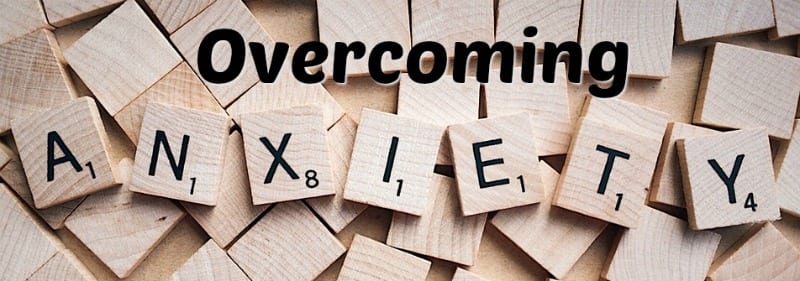Worry is a natural reaction to everyday stresses. Often, people worry about daily issues such as work, school, kids, family, or finances. Many times, the stuff we are worrying about is not something we can change. This worry is typical and can be good for us as it can help us make good decisions or motivate us to make changes to our lives.
However, worry can take over a person’s thoughts causing more than just the typical stress leading to excessive, overpowering, or even irrational thoughts. This worry may go on for an extended period of time and may actually be a form of an anxiety disorder. When anxiety becomes so overwhelming that it interferes with daily activities, it may be a sign that you need help.
Signs of anxiety will look different in each person but some typical anxiety symptoms may be:
- Extreme worrying that lasts for several months
- Feeling agitated, restless, or on edge
- Getting tired easily
- Difficulty concentrating
- Self-consciousness
- Flashbacks
- Upset stomach, nausea, or vomiting
- Having your mind wander or go blank
- Muscle tension
- Sleep disturbance – difficulty falling asleep and staying asleep
- Over-planning
- Excessive list making
- Perfectionism
- Racing thoughts
- Compulsive behaviors
- Seeking reassurance from others
- Panic attacks
- Avoiding social situations
- Irrational fears
There are several ways to treat anxiety. Some strategies often used to relax and reduce anxiety are:
Eating Healthy: People often underestimate the importance of food as a mood balancer. Food affects every part of our body, including our mood. Sugary and high fat foods can worsen anxiety. Alleviating sugars and adding foods such as fruits, vegetables, fish, nuts, and whole grains can help lower anxiety levels.
Limiting Caffeine: Excessive caffeine intake may worsen feelings of anxiety in some people, especially those who already feel agitated, restless, or have racing thoughts.
Avoiding Alcohol: Anxiety disorders and substance abuse are strongly related, so it may help to abstain from alcoholic beverages or non-prescription medication. Likewise, quitting smoking is associated with improved mental health as well.
Exercise: Exercise is extremely helpful in managing anxiety, as it releases brain chemicals that counteract our low mood. Exercise allows the brain to take a break from worries, and work off “nervous energy.” Even a five-minute walk can be effective in reducing stress levels.
Cognitive Interventions: Most people with anxiety frequently make two errors in their thinking: either they overestimate the situation (if something bad can happen, it will) or they underestimate their own ability to cope with the situation (I can’t do this). Challenging these thought patterns will help you learn to recognize a distressing thought and whether it is a realistic thought. You may need to ask yourself whether this belief is productive or if it is getting you closer to your goal.
Meditation: Learning ways to relax is a good way to process your emotions. Meditation, emotion regulation, deep breathing exercises, prayer, and mindfulness are ways to help you identify and experience those underlying emotions.
Journaling: Writing down your worries can be an effective way to process where you are experiencing the most anxiety. Try these journaling steps to reach an attainable solution.
- Write down what you believe is the main issue.
- Write down possible solutions, even bad ones.
- Think about each solution.
- Choose the most practical solution.
- Plan how you will carry that solution out.
Medication: Medication, along with other strategies, can be a good way to reduce anxiety. There are several types of medications that may work so it is best to talk with a health care professional about the option that may be best for you.
Take a Social Media Break: Scrolling through social media means you are exposed to events that may trigger anxiety. Not to mention that we tend to compare our lives to those we see on social media. Instead of constantly checking your notifications, plan for breaks, especially on days where you feel more anxious.
Warm Up: A natural tendency in people is to get cold hands when feeling anxious. This is usually good as it signals there may be something going on that is worth getting anxious over. However, if someone is constantly anxious, this signal is lost and hands stay cold. An easy way to calm yourself is to take a red light (they have a heat sensor in them) and shine it on your fingers for about five to ten seconds each. This biofeedback technique will raise the temperature in the hands causing you to be less anxious.
Accept Your Anxiety: Embracing your anxiety will help you to be in control of it. Understand that there will still be struggles but tell yourself that you are strong enough to deal with them when they happen.
Just Do It: Often, people respond to anxiety with avoidance. It might seem appealing to avoid doing the thing that makes you anxious but instead of putting it off, do it right away.
Recognize Signs of Anxiety: Each person feels anxiety a little differently, and therefore each person will respond better to some coping methods than to others. Understand how your body reacts to anxiety. You may feel butterflies in your stomach or your chest tightens. You may completely freeze, get nauseous, breathe heavy, or get sweaty palms. When you do notice these signs, take some deep breaths and use the best calming method that works for you. It may be another strategy on this list.
Keep a Healthy Routine: Anxiety feeds on unhealthy activities such as poor sleep or excessive junk food. Not only will you feel better overall but keeping a healthy routine may lessen the intensity of your anxiety. Try not to overhaul your whole life overnight though. Start with just one habit to focus on maintaining for one week. As each routine becomes more ingrained, you can add another healthy habit.
See a therapist: If your anxiety is severe and you feel anxious more often than not or your anxiety is interfering with daily life, it may be time to seek professional help from a caring counselor. This often includes a mixture of the therapies listed above. A mental health provider can help you navigate and manage your anxiety as quickly and safely as possible.
It is important to remember that having anxiety is not your fault. With support, the right treatment, and a solid understanding of the disorder, you can overcome anxiety. If you feel like you need more help in dealing with anxiety, call us at 402-991-0611 x 2022 and we can help you assess and treat your anxiety.

